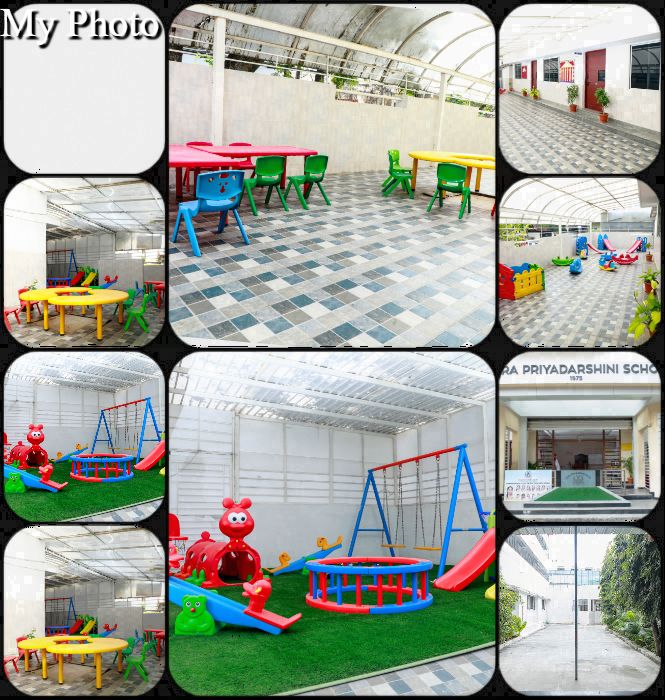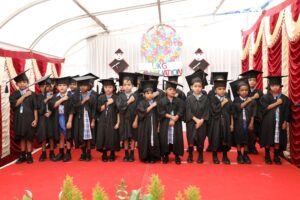Joy of Learning

Learning is Fun
The Joy of Learning Preschool: A foundation for learning
Fun, Caring and Joyful
At Indira Priyadarshini Preschool, we offer our children a caring and joyful early education experience as they begin their journey of learning. Our preschool program has been designed keeping in mind the STEM and Literacy focus in the Primary and Middle School. The program for each preschool year is loaded with fun and stimulating activities designed to nurture the natural curiosity and sense of wonder innate in each child.
Experience-Rich Learning Environment
The mind of a child grows fastest during its first five years and this is a period of maximal learning. Our preschool program supports this phase by providing rich learning experiences – hands-on, outdoor, learning centre-based, audio visual, and group and individual activities. In accordance with our belief that learning through play is the best at this early stage, all our lessons are play-based and include a lot of movement, dance, singing and fun.
Carefully Crafted Routine
To keep their interest levels high throughout the school day, we have a carefully designed daily routine in which sessions are kept short and children transition from activity to activity without losing valuable learning time. We use Orient BlackSwan’s “My Best Friend” series of textbooks, which provide focus on the development of 21st century skills, problem solving skills, life skills and values in children, as our primary reference material.
Social Adjustment
Children are encouraged to move and engage with one another throughout the school day. Circle Time Conversations, Daily Read-Alouds, Helper Roles and Announcement Responsibilities that are assigned daily help the children become confident communicators and to grow socially and emotionally. Our trained staff unobtrusively observe and record the performance of each child every day as they go through their daily routine, and provide reinforcement whenever a child needs it. We ensure that students achieve mastery in all key developmental aspects at their own pace, neither hurrying them nor cutting short teaching in order to force fit the learning to a schedule. Observation parameters are regularly shared with parents.
Pre School Programme
Program | Minimum Age as of June 1st | Hours |
Toddler | Two years and six months | 9:00AM to 12:00PM |
KG1 | Three years and six months | 9:00AM to 1:00PM |
KG2 | Four years and six months | 9:00AM to 1:30PM |
Activities over the Month
Values of the month | Story-telling | Reading (Guided, Group, Self) | Rhymes of the month |
Dance | Yoga | CCA | Outdoor Games |
Numeracy | Literacy | UTW | Vocabulary |
Public Speaking | Movie Time | Theater Play | Creative Centers/STEAM |
Field Trip |
Typical Day
8:00 – 8:40 . | Free-Choice center/table activities, which reinforce specific areas of development |
8:40 – 9:00 | Morning Circle Time (greeting, singing, prayer, calendar routine, an introduction to the topic of the day) |
9:00 – 9:30 | Music, movement activity, or Spanish |
9:30- 10:00 | Thematic integrated lesson/hands-on activity |
10:00 – 10:30 | Snack time (students eat while engaging in conversation with peers and teachers) |
10:30 – 11:00 | Gym/outdoor time (gross motor/movement activity) |
11:00 – 11:30 | Free-Choice Center activities which include several main areas of development (open-ended art experiences, crafts, writing, discovery table, listening to books, design and construction with blocks, tracks or gears, math games, dramatic play, library) |
11:30 – 12:00 | Closing Circle, prepare for departure (recap the day with opportunities for students to share their personal reflections), and some free-choice activities. |
Play Way and Montessori Methodology
“Learning is Fun” is the guiding principle of our School. No where is it more put to use than at the “Joy of Learning” Pre-Primary section. The curriculum is developed based on Play Way and Montessori methodologies. The Play Way method is an activity based learning system. Children are given abundant opportunities to participate in activities that they find exciting and in the process learn new ideas and concepts. The method encourages expression and creativity in children. It leads to development of motor, creative, aesthetic, imaginative, linguistic, cognitive, social and such other skills.
The Montessori method also gives importance to experiential learning. But this method provides a structure to enable children to learn. Based on the aptitude and flair of the child teachers offer activities and guide the child to nurture their skills. The Montessori method like the Play Way relies on natural curiosities and creativity in tender minds that excites them in to activities. Montessori class rooms are designed to inspire curiosity and creativity in young minds.

My Best Friend
“My Best Friend ” series of learning material is published by Orient Black Swan publishers. The syllabus is developed in compliance with Early Childhood Care and Education(ECCE). The ECCE guidelines were developed by by UNESCO primarilly to compensate disadvantage in the familly and for combating educational inequality. ECCE norms have been adopted in the New Education Policy promulgated by Government of India in 2020. The aim of ECCE guidelines is the holistic development of a child’s Social, Emotional, Cognitive an Physical needs to build a solid foundationof lifelong learning and well being. ECCE eventually aims to nurture caring, capable and responsible future citizens.
At IPS “Joy of Learning” the policies and methodalogies are current and are adopted to local needs. A great deal of thought goes into blending proven techniques with latest methodologies suited to local conditions to deliver best possible value. “My Best Friend” is the product of such practices.
Phonics
Phonics is a method of using sounds to help children read and write. It is a means of introducing children to written language. Sounds are more natural and comprehensible to children than written text. Phonics takes advantage of this natural trait in children to learn reading and writing. In practice sounds are associated with letters or groups of letters seen as images. Phonics then is the beginning and foundation of linguistic skill development. Rhymes are an evolutionary stage of Phonics. The resources we use at “Joy of Learning” has been developed in-house with the help of subject matter experts. Over time these have proved their credibility and are effective in developing linguistic skills.
Circle Time
Circle time is yet another concept that is practiced at “Joy of Learning”. The aim of circle time is to instill social skills in children. Circle time involves informal gathering of students where the teacher explains social concepts and acceptable norms of community behavior. This is repeated frequently so that children understand the idea and practice it. The informal setting and frequent repetition helps comprehension. Circle time is habit forming and these ideas become second nature to students. Over time it influences behavior and develops social skills.

